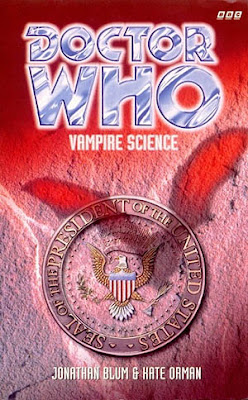EDA 2: Vampire Science, by Jonathan Blum and Kate Orman (Eighth Doctor Novel)
BLOT: (24 Sep 2010 - 12:40:38 AM)
EDA 2: Vampire Science, by Jonathan Blum and Kate Orman (Eighth Doctor Novel)
I am not the biggest fan of Terrance Dicks'

Joining the Doctor is Sam Jones, the Dicks created (I think this might be the last time I say his name) new companion from the previous book; a General Kramer from UNIT who was introduced in the Jonathan Blum fan-film
Ok, the rough story. Doctor is summoned by Carolyn because her boyfriend is missing. Vampires are involved. The Doctor and Sam investigate and find a small clan operating in San Fransisco. As they get more and more tangled up in this, they find the head vampire, who appears to be a middle aged medical scientists. She is on the brink of a no-more-humans-required blood solution, but her younger brood is caught up in the thrill of the hunt and the internal pressures are threatening to unbalance the clan. In order to prove that he does not want to merely wipe them out, the Doctor enters into a blood pact (linking him to the head vampire) and tries to help her to overcome her trouble-makers. Tensions build up, mistakes are made, and hey, that's
There are two big themes in this, outside of the vampire elements. One works, one doesn't. The one that doesn't work is the "huggy Doctor" theme. The Eighth Doctor is full of hugs. In this novel, he is trying to make the Eleventh Doctor seems unloving by comparison. In one awkward to read, to picture, and to act out scene, he is cooking breakfast and hugging Sam. Trite. Unnecessary. And it comes across as someone not quite sure what to make of the scene between the Eighth Doctor and Grace Holloway from The Movie. By the end of the book, it is addressed openly and toned down, but I don't like it. Especially since this takes place three years into the Doctor's regeneration. That weird "early days" syndrome he gets would have warn off completely.
The theme that does work, and is contrasted to
As for the vampires, they barely had enough steam to make it to the end of the novel. There is are two key build ups towards the end, one at a club and one at a theater, and the tension nearly holds to the first one and has bottomed out by the second. The story still flows enough to get by without requiring an obvious hook, but once you have established that the Doctor can more than handle them (he and the other Time Lords are something of a dark legend to the vampire kind), and the previous novel had a turned-companion and the prior two stories had bigger vampires and more; what can you do? Just drive the point home by having them beaten again? The attempt at empathy, including the direct contradiction to the tenets of Rassilon, were a nice touch, and about the last card left playable unless something else happens (faux-vampire tales like "Venice" not counting).
Which leaves just the final scores for the novel. It felt like it should have ended about fifty pages before it did, so that's a minus one, and it had little new to say for either vampires or San Fransisco, so that's another deduction. However, the roguish Doctor negates one of those minuses and both the mystery of his three missing years and the development of Sam Jones negates the other. The hugging counteracts the pace and character of the novel, both of which fit very much in the "new-
TAGS: Doctor Who
PS: No, by the way, I don't remember there being a reason for the president's seal to be on the cover...unless that's a tongue-in-cheek nod towards Rassilon's seal and the novel being set in the US.
* For right now, I'm skipping Dying Days but will come back to it.
BY WEEK: 2010, Week 38
BY MONTH: September 2010
dickens of a blog




Written by Doug Bolden
For those wishing to get in touch, you can contact me in a number of ways

This work is licensed under a Creative Commons Attribution-ShareAlike 3.0 Unported License.
The longer, fuller version of this text can be found on my FAQ: "Can I Use Something I Found on the Site?".
"The hidden is greater than the seen."

